Ustad Zakir Hussain: The Life and Legacy of a Tabla Maestro
Updated on : 16 December, 2024
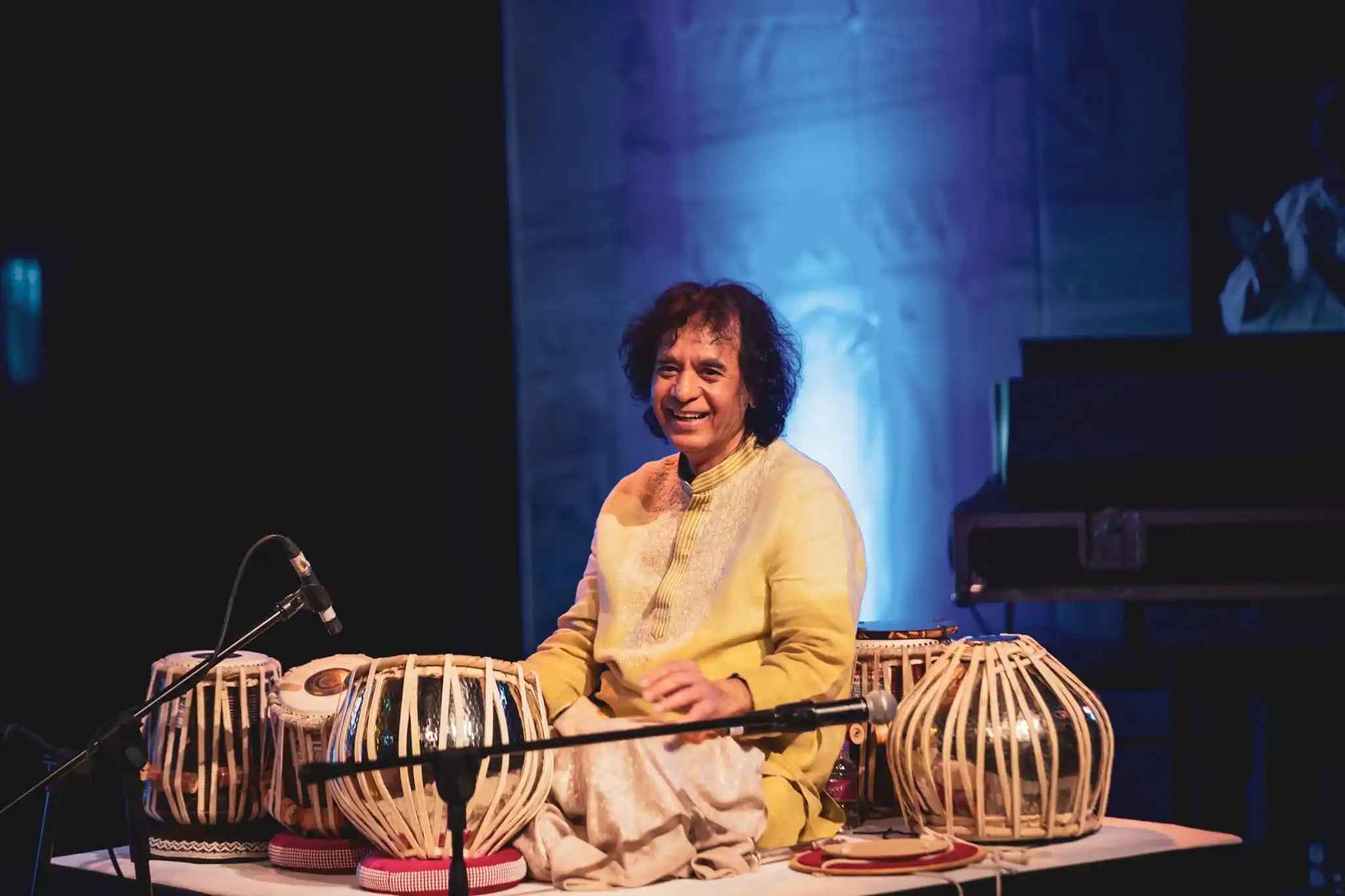
Image Source: facebook.com
Ustad Zakir Hussain, born on March 9, 1951, in Mumbai, is a legendary tabla virtuoso who has significantly influenced both Indian classical music and global percussion. As the son of esteemed tabla player Ustad Alla Rakha, he was immersed in music from a young age. Hussain transformed the tabla's role from a mere accompaniment to a lead instrument, showcasing its intricate rhythms and emotional depth. His innovative collaborations with artists across various genres, including jazz and Western classical music, helped bridge cultural divides and introduced Indian rhythms to diverse audiences worldwide. His legacy continues to inspire musicians globally.
Overview of Ustad Zakir Hussain's Legacy
Ustad Zakir Hussain, the son of the legendary tabla player Ustad Alla Rakha, was immersed in music from a young age. His early exposure and rigorous training under his father laid the groundwork for a remarkable career that spanned over six decades. Recognized as a child prodigy, Hussain quickly established himself as a master of the tabla, captivating audiences with his extraordinary talent. He transcended the role of a mere performer to become a cultural ambassador, showcasing the beauty of Indian classical music to global audiences.
Significance in the World of Music
Hussain's contributions to music were profound and far-reaching. He collaborated with artists across various genres, including jazz and Western classical music, which helped elevate the tabla's status from accompaniment to a lead instrument in performances. His innovative approach redefined rhythmic possibilities and showcased the tabla's versatility. Through projects like Shakti and Tabla Beat Science, he pushed musical boundaries and fostered cultural exchange, making Indian rhythms accessible and appreciated worldwide. His legacy continues to inspire musicians and audiences alike.
Early Life and Background
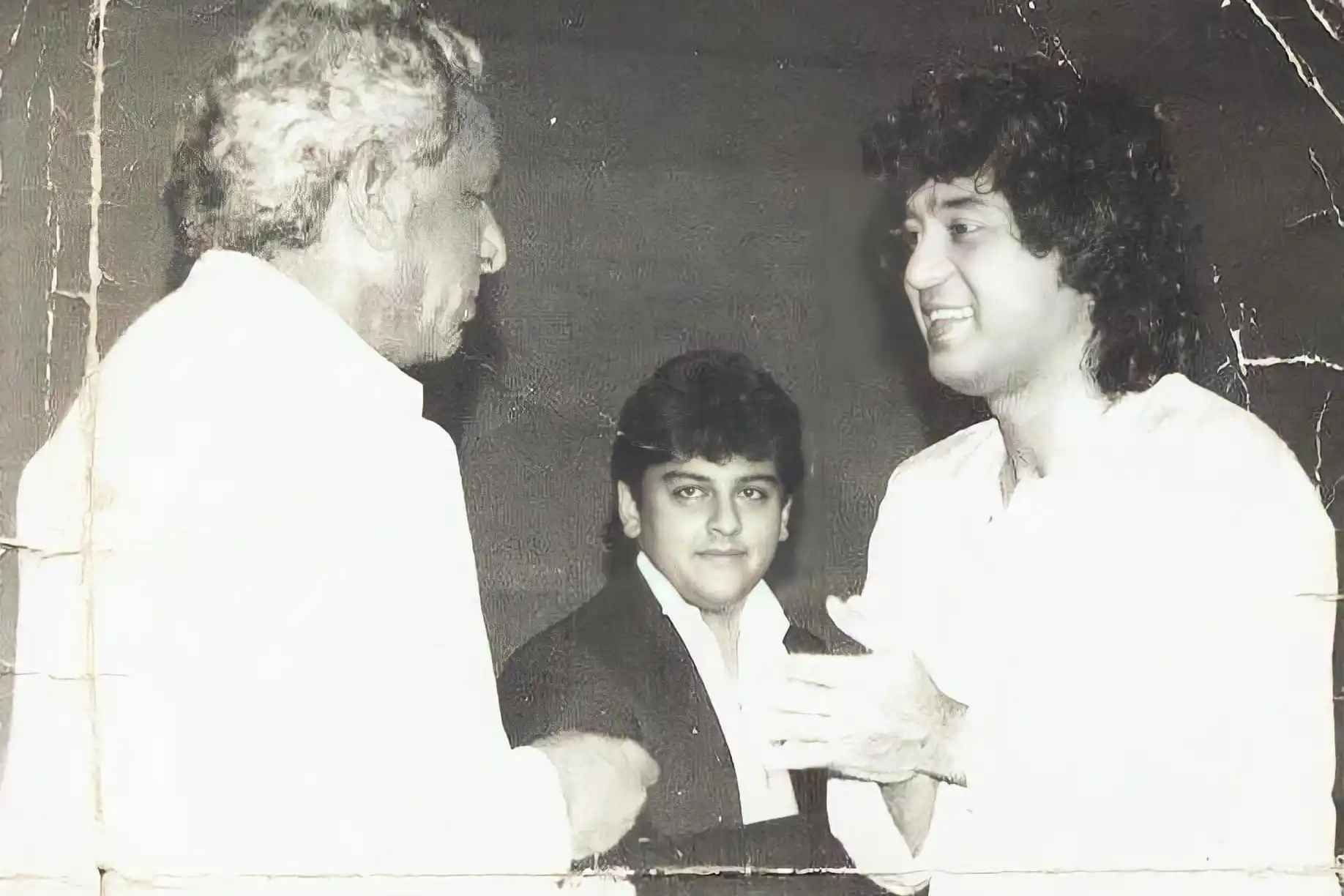
Image Source: twitter.com
Birth and Family Background
Ustad Zakir Hussain was born into a family rich in musical tradition, significantly shaping his artistic journey. His father, Ustad Alla Rakha, was a prominent tabla player renowned for his collaborations with sitar virtuoso Ravi Shankar. This familial connection to music was pivotal; Hussain's early exposure and rigorous training under his father laid the foundation for his remarkable career.
Hussain began performing professionally as a teenager, quickly gaining recognition for his extraordinary talent. He attended St. Michael’s High School and St. Xavier’s College in Mumbai, where he balanced his education with his burgeoning music career. His dedication to the tabla, combined with his father's influence, allowed him to transform the instrument's role from mere accompaniment to a lead performer in classical music.
Continuing the family's musical legacy, Hussain's brothers, Taufiq and Fazal Qureshi, are also accomplished percussionists. Zakir Hussain's marriage to Antonia Minnecola, a Kathak dancer and teacher, further intertwines his life with the arts, as they have two daughters, Anisa and Isabella Qureshi, who are also involved in creative pursuits.
Introduction to Tabla and Musical Roots
From an early age, Ustad Zakir Hussain displayed extraordinary talent in music. He began learning the tabla at the tender age of four, and by seven, he had already given his first public performance, showcasing his innate rhythmic abilities. His introduction to the tabla was deeply rooted in his family's musical tradition, particularly influenced by his father, Ustad Alla Rakha, a renowned tabla player. Hussain's early training involved rigorous practice sessions under his father's guidance, where he internalized the language of rhythm through the traditional guru-shishya parampara (teacher-student tradition). This foundational training not only honed his technical skills but also instilled in him a profound respect for classical music.
Influence of His Father, Ustad Alla Rakha
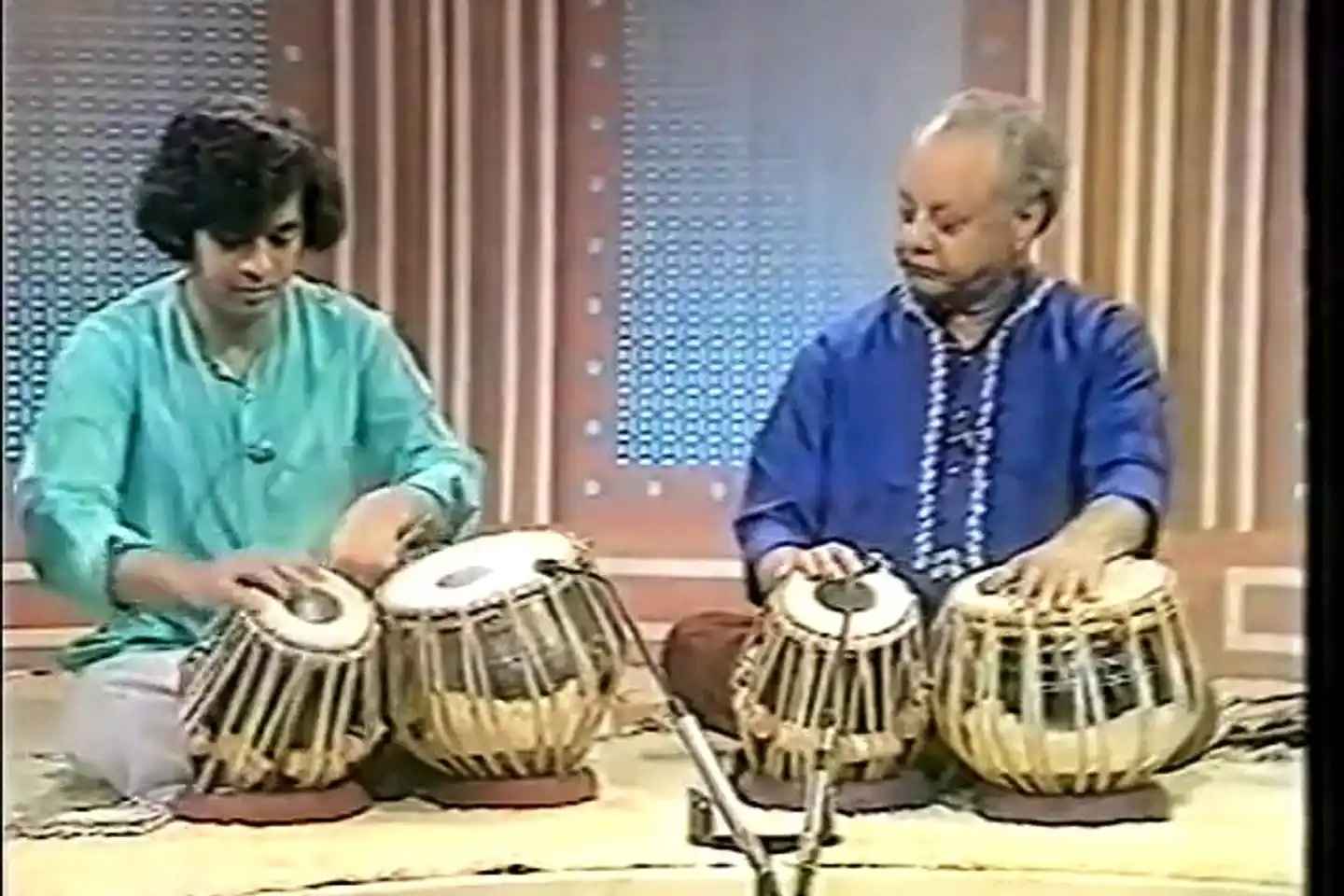
Image Source: dailymotion.com
Ustad Alla Rakha played a pivotal role in shaping Zakir's musical journey. He emphasized the importance of understanding rhythm's essence and encouraged his son to explore beyond classical confines. This encouragement allowed Hussain to develop his unique voice within the tradition while maintaining a strong connection to its roots. His father's innovative teaching methods and deep musical knowledge inspired Hussain to push boundaries, ultimately transforming the tabla's role in performances and elevating its status on the global stage.
Musical Training and Early Achievements
Ustad Zakir Hussain's musical journey began at an exceptionally young age, reflecting his extraordinary talent and dedication. He started learning the tabla at the age of four, immersed in a household steeped in musical tradition, thanks to his father, Ustad Alla Rakha. By the age of seven, Hussain gave his first public performance, showcasing his innate rhythmic abilities and captivating audiences with his skill. His early training was rigorous, involving hours of practice rooted in the traditional guru-shishya parampara (teacher-student tradition), where he would often wake up before dawn to practice with his father.
By the age of twelve, Hussain was already touring internationally, performing alongside esteemed musicians and gaining recognition for his exceptional skills. This early exposure to diverse musical environments not only honed his technical proficiency but also allowed him to develop a unique style that blended traditional Indian rhythms with contemporary influences. His remarkable achievements at such a young age laid the foundation for a prolific career that would see him elevate the tabla to new heights on the global stage.
Rise to Prominence
Zakir Hussain's rise to fame is marked by groundbreaking collaborations and performances at prestigious venues worldwide. He co-founded the band Shakti in the early 1970s, which blended Indian classical music with jazz elements, garnering critical acclaim and expanding his audience. This innovative fusion not only showcased his exceptional tabla skills but also introduced Indian rhythms to a broader audience, bridging cultural divides.
Hussain's international recognition grew as he performed alongside renowned musicians like George Harrison of The Beatles and collaborated with jazz legends such as John McLaughlin. His ability to seamlessly integrate traditional Indian music with various genres allowed him to captivate diverse audiences and elevate the status of the tabla on the global stage.
His performances were characterized by their energy and creativity, earning him a reputation as one of the leading percussionists in the world. Through his artistry, Zakir Hussain not only achieved personal success but also played a crucial role in popularizing Indian classical music internationally, leaving an enduring legacy that continues to inspire musicians today.
Global Contributions
Zakir Hussain's influence extended far beyond Indian classical music, as he collaborated with renowned artists such as Yo-Yo Ma, Béla Fleck, and Edgar Meyer, effectively bringing Indian rhythms to diverse musical landscapes. His groundbreaking work with the fusion band Shakti, which he co-founded in the early 1970s, blended Indian classical music with jazz elements, garnering critical acclaim and expanding his audience significantly.
Hussain's collaborations with Western musicians played a crucial role in popularizing the tabla in Western music contexts. His performances alongside iconic figures like George Harrison and Mickey Hart helped bridge cultural gaps and introduced Indian percussion to new audiences. Projects like Planet Drum and Tabla Beat Science showcased his ability to merge traditional Indian rhythms with contemporary genres, further solidifying his status as a global cultural ambassador.
Awards and Recognitions
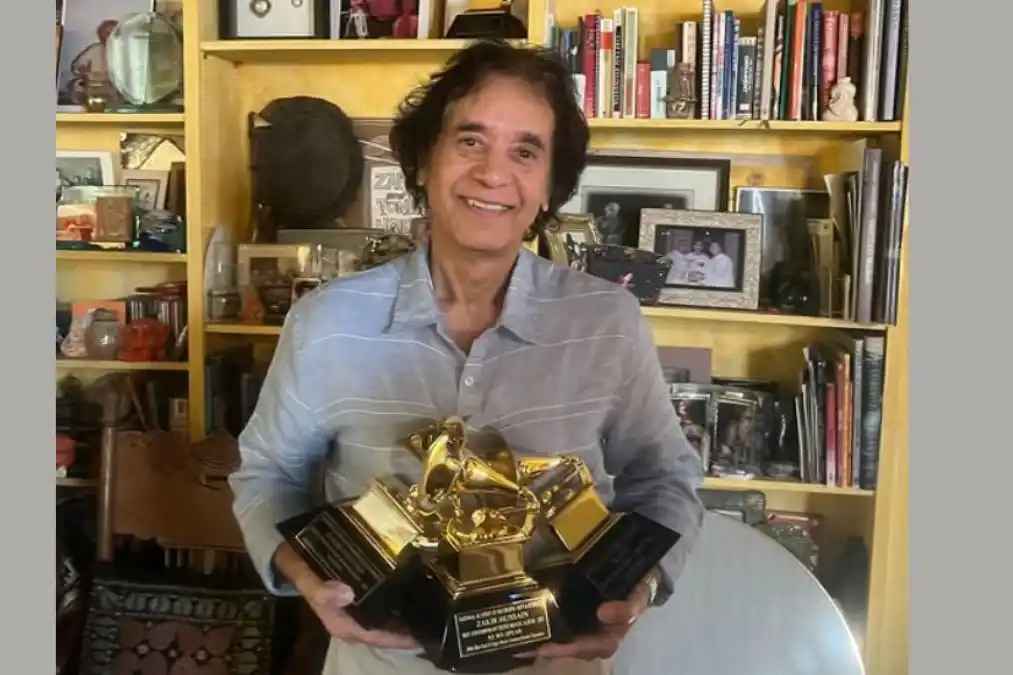
Image Source: herzindgi.com
Ustad Zakir Hussain's illustrious career is marked by numerous accolades that reflect his profound impact on music and culture. He has received four Grammy Awards throughout his career, including a historic achievement in 2024 when he became the first Indian musician to win three Grammys in a single night at the 66th Annual Grammy Awards. These awards included Best Global Music Album for This Moment, Best Global Music Performance for Pashto, and Best Contemporary Instrumental Album for As We Speak.
In addition to his Grammy successes, Hussain has been honored with several prestigious awards, including the Padma Shri in 1988, the Padma Bhushan in 2002, and the Padma Vibhushan in 2023. These honors recognize his contributions to Indian classical music and his role as a cultural ambassador. He also received the Sangeet Natak Akademi Award in 1990 and was awarded the National Heritage Fellowship from the U.S. National Endowment for the Arts in 1999, highlighting his influence on both Indian and global music landscapes.
Contributions to Film and Media
Zakir Hussain's musical talents significantly enriched film soundtracks, allowing him to showcase Indian music on cinematic platforms. His contributions helped introduce traditional sounds to broader audiences through film, effectively bridging cultural gaps.
Hussain composed and performed music for several notable films, including In Custody (1993) and The Mystic Masseur (2002), both directed by Ismail Merchant. His work on these soundtracks highlighted his ability to blend intricate tabla rhythms with various instrumental sounds, enhancing the emotional depth of the narratives. Additionally, he contributed to the acclaimed film Vanaprastham (1999), which premiered at the Cannes Film Festival and won multiple awards, showcasing his prowess as a composer and music advisor.
Beyond Indian cinema, Hussain's tabla performances were featured in international films such as Francis Ford Coppola's Apocalypse Now and Bernardo Bertolucci's Little Buddha, further solidifying his influence in global cinema. His ability to adapt traditional Indian rhythms to different cinematic contexts made him a sought-after musician in the film industry, ensuring that Indian music reached diverse audiences worldwide.
Legacy as a Teacher and Mentor
Ustad Zakir Hussain's legacy extends far beyond his remarkable performances; he was deeply committed to teaching and mentoring young musicians. Recognized as a prolific educator, Hussain believed in nurturing talent and sharing the intricacies of Indian classical music with future generations. His dedication to education was evident in his numerous workshops and masterclasses held globally, where he inspired students from various backgrounds to explore the depths of rhythm and percussion.
Hussain's approach to teaching combined traditional methods with contemporary insights, encouraging students to embrace creativity while respecting the roots of classical music. He often emphasized the importance of discipline and practice, instilling in his students a strong work ethic that mirrored his own journey. His charisma and passion for music made him a beloved figure among aspiring musicians, who found in him not just a teacher but a mentor who genuinely cared about their growth.
His influence as a teacher is reflected in the success of many of his students, who have gone on to make significant contributions to music themselves. Through his commitment to education, Zakir Hussain ensured that the rich heritage of Indian classical music would continue to thrive and evolve, inspiring countless musicians for generations to come.
Personal Life
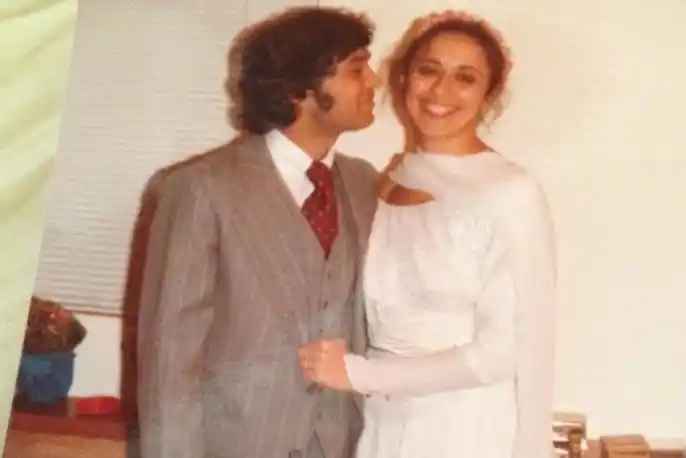
Image Source: indiatoday.com
Ustad Zakir Hussain's personal life was deeply intertwined with his musical journey. He married Antonia Minnecola, a talented Kathak dancer and teacher, who also played a significant role as his manager. The couple's relationship began in the 1970s when they met while Hussain was establishing his career in the United States. Their marriage, however, faced initial resistance from Hussain's family due to cultural differences, as it was the first mixed marriage in his family. Despite this, they wed in a private ceremony, and over time, Hussain's mother embraced Antonia, recognizing her worth beyond traditions.
Together, Zakir and Antonia raised two daughters, Anisa and Isabella Qureshi. Anisa is a filmmaker and a graduate of UCLA, while Isabella is pursuing dance studies in Manhattan. The family maintained a strong bond through their shared love for art and culture, with Antonia ensuring that their daughters were connected to both their Indian heritage and Western influences. Zakir Hussain's commitment to both his family and his art exemplified a beautiful balance between personal and professional life, leaving a lasting legacy that continues to inspire future generations.
Philanthropy and Cultural Promotion
Ustad Zakir Hussain actively promoted cultural exchange through various initiatives aimed at fostering understanding between different musical traditions. His philanthropic efforts included supporting young artists and educational programs focused on traditional music. Throughout his career, he emphasized the importance of sharing knowledge and nurturing talent, believing that music could serve as a powerful bridge between cultures.
Hussain founded Moment Records to release original cross-cultural collaborations and live performances, showcasing the richness of Hindustani and Carnatic music. His Masters of Percussion tours, initiated in 1996, brought together leading percussionists from around the world, providing a platform for collaboration and cultural dialogue.
Additionally, Hussain conducted annual tabla workshops in Northern California, mentoring thousands of students and instilling in them a deep appreciation for Indian classical music. His commitment to education and mentorship ensured that the traditions he cherished would be passed on to future generations. Through these efforts, Hussain not only enriched the musical landscape but also fostered a greater understanding and appreciation of cultural diversity globally.
Ongoing Legacy and Influence
Ustad Zakir Hussain's legacy continues to resonate profoundly within the global music community, even after his passing on December 15, 2024. Widely regarded as one of the greatest tabla virtuosos, Hussain's innovative spirit and dedication to music have inspired countless musicians around the world. His ability to blend Indian classical music with diverse genres, particularly through his groundbreaking collaborations with artists like Yo-Yo Ma, Béla Fleck, and Edgar Meyer, helped popularize the tabla in Western music contexts.
Hussain's work with the fusion band Shakti remains a significant chapter in contemporary music, showcasing his commitment to bridging cultural divides. His contributions were recognized with multiple Grammy Awards, including three won in a single night at the 2024 Grammys, highlighting his unparalleled influence on the music landscape.
Beyond performance, Hussain was dedicated to teaching and mentoring young musicians, ensuring that the rich traditions of Indian classical music were passed on to future generations. His warmth and humility left an indelible mark on all who encountered his work, making him not just a musician but a beloved cultural ambassador. As tributes pour in from around the world, it is clear that Hussain's rhythms will continue to inspire and uplift for generations to come.
Conclusion
Reflection on Ustad Zakir Hussain’s Enduring Impact
Ustad Zakir Hussain's life was a celebration of rhythm and tradition that transcended borders. His ability to connect with audiences through his art left an enduring impact that will be felt for generations. As a master tabla player and cultural ambassador, Hussain not only elevated the status of Indian classical music but also fostered a greater understanding of its intricacies across diverse cultures. His innovative collaborations with artists from various genres, including jazz and Western classical music, showcased the universal language of rhythm, making his work a bridge between different musical traditions. Tributes from musicians and fans worldwide reflect the profound influence he had on the global music landscape.
Vision for the Future of Indian Classical Music
As we reflect on his contributions, there is hope that future generations will carry forward his vision of blending tradition with innovation in Indian classical music. Hussain's legacy serves as an inspiration for young musicians to explore new horizons while remaining rooted in their cultural heritage. By embracing both traditional techniques and contemporary influences, the next generation can ensure that Indian classical music remains relevant in an ever-evolving global landscape. His dedication to teaching and mentoring young artists further solidifies this vision, as he instilled in them the importance of creativity and exploration within the framework of classical traditions. Through these efforts, Ustad Zakir Hussain's spirit will continue to resonate, guiding future artists in their musical journeys.







